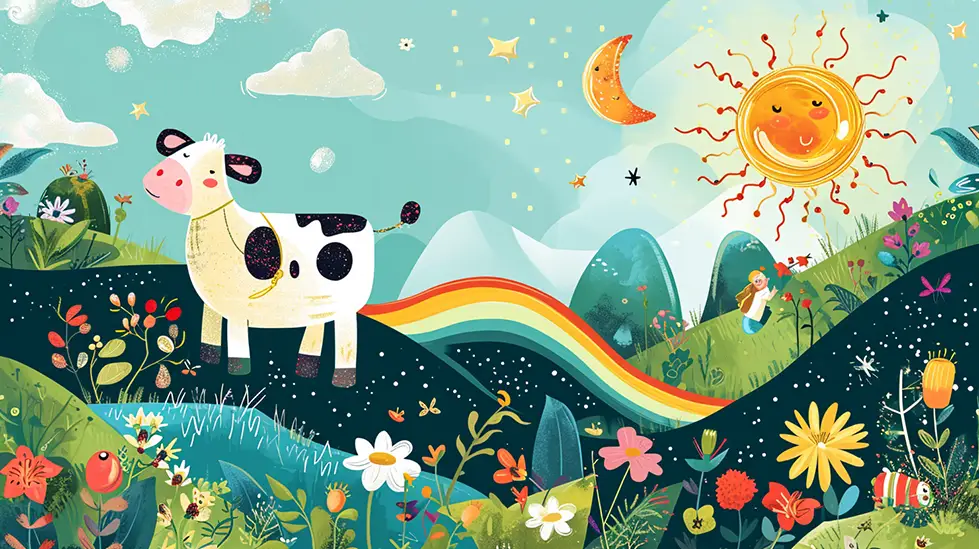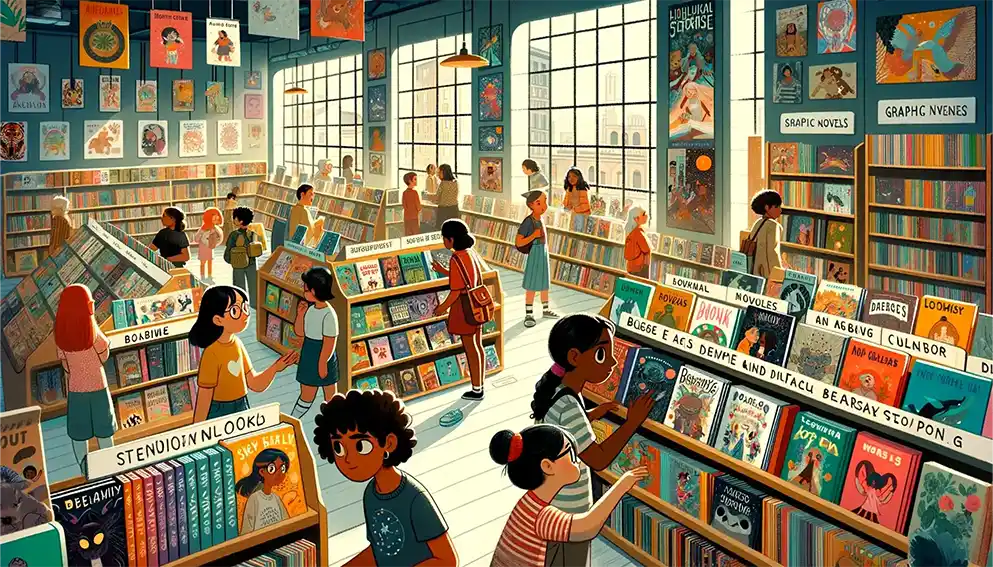In our journey through literature, we often discover worlds beyond imagination, and nowhere is this more vividly cultivated than through children’s science fiction books. At Snowball AI, we embrace the voyage into the unknown that science fiction offers to young minds. Let us guide you through the realms of futuristic adventures, interstellar journeys, and the exploration of the unknown that define children’s science fiction literature.
| Key Takeaway | Description |
| Imagination and Scientific Concepts | Children’s science fiction books ignite imagination by integrating scientific concepts, often including themes like space and time travel. |
| Creativity and Educational Value | These books encourage creative thinking and blend entertainment with scientific facts, aiding in both education and entertainment. |
| Evolution and Adaptation | Reflecting societal changes and scientific advancements, children’s science fiction has evolved from classic tales to modern stories, enriching the genre. |
| Fiction with Factual Elements | While categorized as fiction, science fiction often incorporates educational elements, making it a blend of imaginative and factual content. |
| Engaging and Positive Content | Selection of these books should focus on engaging narratives with positive messages, stimulating intellectual curiosity. |
| Age-Appropriate Introduction | For younger children, science fiction is introduced through picture books and early readers with simpler storylines and engaging visuals. |
Definition of Science Fiction in Children’s Literature
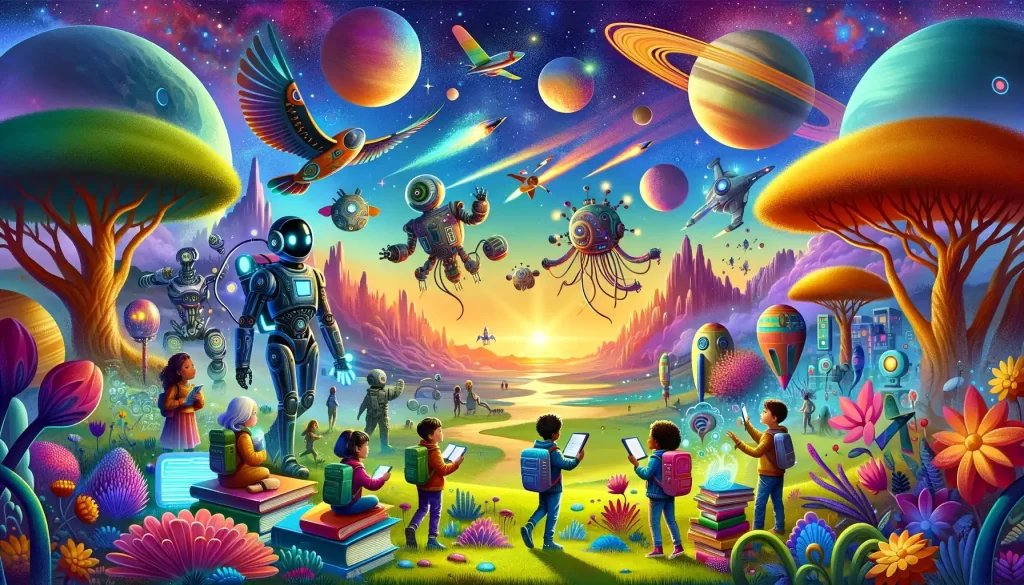
Understanding the genre begins with defining science fiction in a context that resonates with younger audiences. Science fiction, or sci-fi, explores imaginative concepts grounded in scientific principles, theories, or advancements. It encompasses a broad array of subjects, including but not limited to space travel, time travel, futuristic societies, and advanced technology.
Key Takeaways:
- Children’s science fiction sparks imagination with scientific concepts.
- Sci-fi for kids often includes space and time travel, among other futuristic themes.
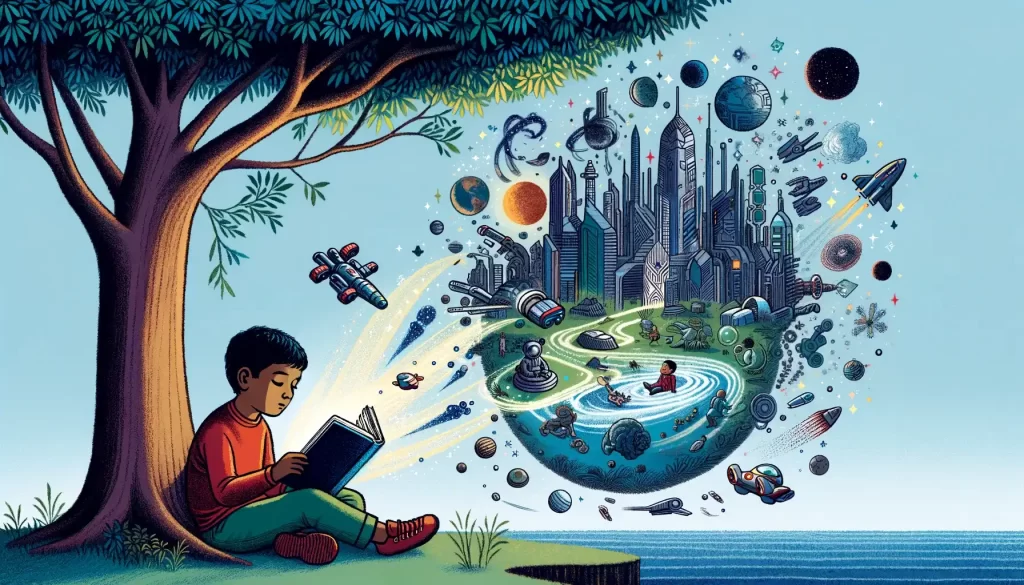
The Appeal of Science Fiction Books for Children
Science fiction books have a unique appeal to young readers, offering an escape from the mundane and igniting the fires of curiosity and wonder about the universe and beyond. Through these stories, children learn to question, to theorize, and to imagine possibilities that stretch beyond the limits of our current reality.
- Creativity: Sci-fi encourages children to think creatively and envision new worlds.
- Education: It blends entertainment with interesting scientific facts and theories to educate while entertaining.
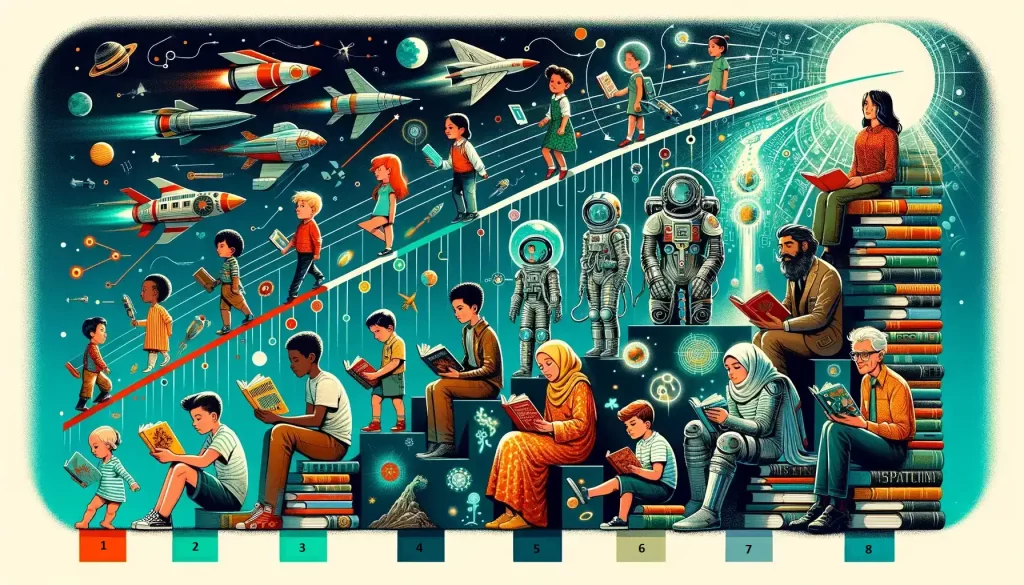
The Evolution of Children’s Science Fiction Books
From the 1950s classic tales to the contemporary era, children’s science fiction books have evolved, adapting to new generations’ tastes and the ever-changing landscape of science and technology. The genre’s legacy is part of a larger tapestry that includes esteemed classics and modern masterpieces alike, reflecting societal changes and scientific advancements.
“Science fiction is an incubator for imaginative minds to create visions that pave the way for humanity’s future.” — Snowball AI’s Guide to Educational Children’s Books
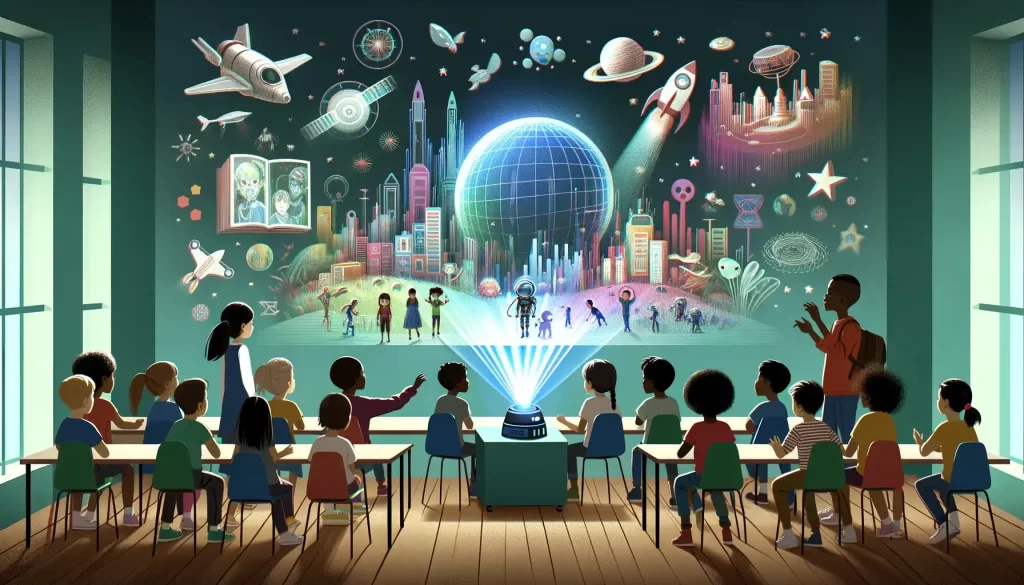
Are Children’s Books Fiction or Nonfiction?
This common inquiry among parents and educators points to a broader discussion about literature’s role in learning. Children’s books can be both fiction and nonfiction, with each playing a significant role in development. Science fiction falls under the fiction category but often incorporates factual elements to ground the story in a relatable context.
Key Insights:
- Children’s books encompass both fictional and nonfictional works.
- Science fiction is categorized as fiction but incorporates educational elements.
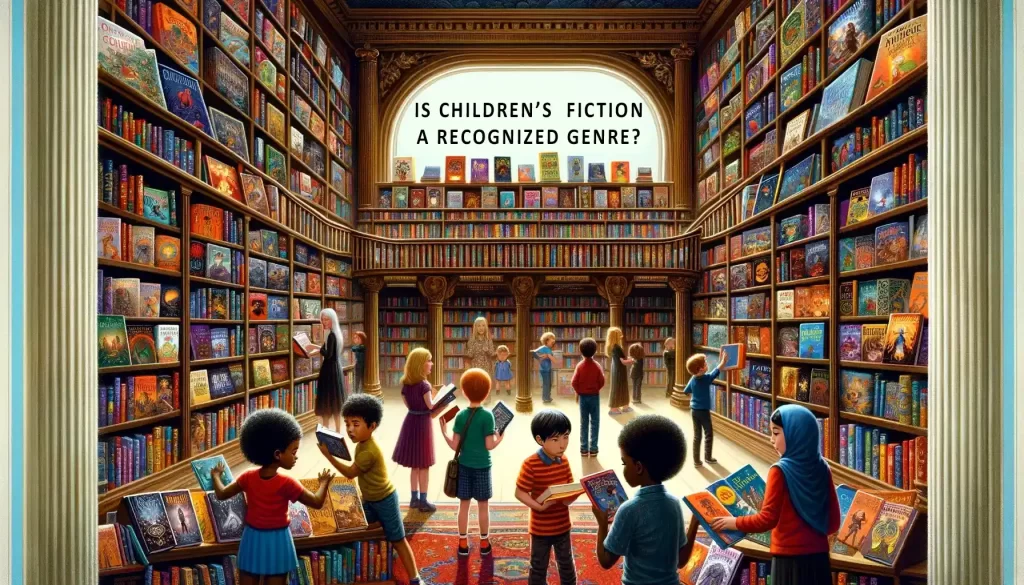
Is Children’s Fiction a Recognized Genre?
Yes, indeed, children’s fiction is a recognized and cherished genre within literature, comprising multiple sub-genres including fantasy, adventure, and science fiction. These diverse narratives foster a child’s developmental and cognitive growth, making them a staple within educational and entertainment spheres.
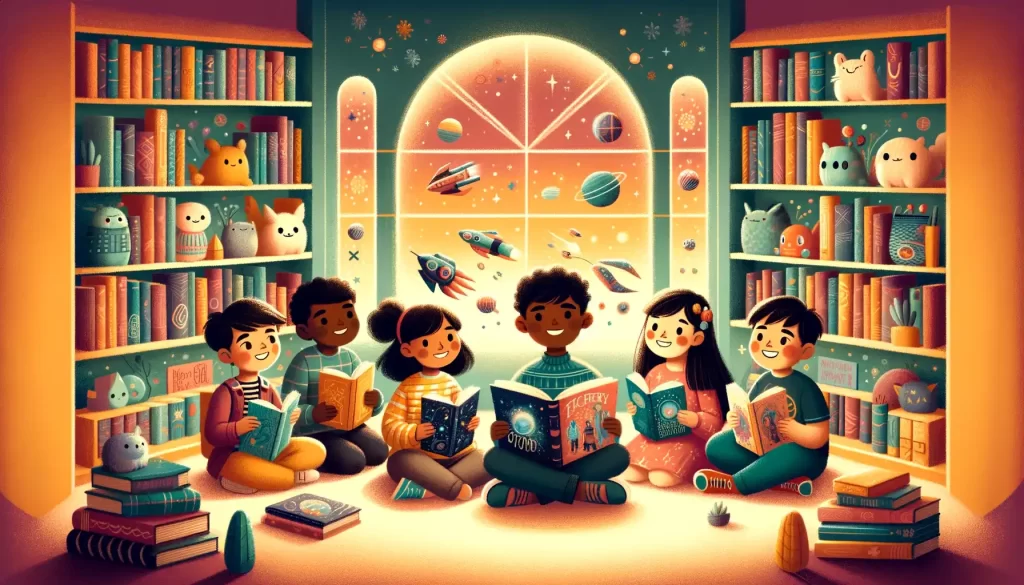
Selecting the Best Children’s Science Fiction Books
Choosing the best books within this genre can be a delightful challenge. Parents and educators should look for stories that not only captivate but also convey positive messages and stimulate intellectual curiosity. The Children’s Fantasy Adventure Books Guide at Snowball AI offers a curated selection of titles that embodies these qualities.
Selection Criteria:
- Engaging narrative
- Positive themes and messages
- Stimulating content that encourages questioning and learning

Celebrated Authors of Children’s Science Fiction
There are numerous authors who have made their mark in the genre, crafting stories that have stood the test of time. These authors convey compelling stories that resonate with young minds, driving a deeper appreciation for science and adventure. Some notable children’s science fiction authors include:
| Author Name | Famous Work |
| Madeleine L’Engle | A Wrinkle in Time |
| J.K. Rowling | Harry Potter series |
| Rick Riordan | Percy Jackson series |

Science Fiction in Early Childhood: Picture Books and Early Readers
Finding age-appropriate science fiction for younger children is essential for early development. Picture books for toddlers and early readers introduce foundational concepts of science fiction through engaging visuals and simpler storylines. Our Picture Books Guide for Toddlers provides excellent starting points for children embarking on their literary journey.
- Age-appropriate content
- Engaging visuals and narratives

The Unwavering Popularity of Children’s Books
Despite the digital age’s rampant growth, children’s books have remained a beloved constant in homes and schools around the world. The tactile experience of a book in hand, coupled with the immersive storytelling found within its pages, ensures that children’s books retain their timeless appeal.
- Books offer a sensory experience that digital media cannot replicate.
- The storytelling aspect of books is key to engaging young readers on a deeper level.

The Plausibility of Science Fiction Concepts
“Can science fiction be real?” This question underscores the intriguing blend of factual science and speculative fiction. Many sci-fi concepts, such as space exploration and advanced robotics, have roots in reality, which adds an educational aspect to the enjoyment of the genre.
Intriguing Fact:
- Science fiction has often predicted technological advancements long before they become reality.

Notable Examples of Science Fiction Children’s Books
Exploring examples of science fiction children’s books, we unveil a treasure trove of titles that have inspired generations of dreamers and thinkers. Books like “The Giver” by Lois Lowry and “Ender’s Game” by Orson Scott Card are prime examples that have made a significant impact on young readers’ lives.
Selection of Notable Titles:
- “The Giver” by Lois Lowry
- “Ender’s Game” by Orson Scott Card
- “City of Ember” by Jeanne DuPrau

The Commercial Success of Science Fiction Books
Considering the inquiry, “Do science fiction books sell?“, one must look at the immense popularity of franchises like Star Wars and Marvel, which started with the written word. The ability of science fiction to capture the collective imagination ensures its commercial success and enduring presence on bookshelves across the globe.
- Sci-fi franchises continue to dominate the entertainment industry.
- Book sales in this genre have remained strong, reflecting its popularity.

The Distinction of Children’s Books as a Genre
To address whether “Is children’s book a genre?“, it’s important to understand that children’s literature is an umbrella term that includes a plethora of genres catered to youths. It possesses its own set of conventions and themes, making it a distinct and integral part of the literary world.
Distinctive Elements:
- Children’s books have unique conventions and thematic considerations.
- The genre is tailored specifically to engage young readers and contribute to their growth.

The Essence of Science Fiction in Children’s Literature
When one asks, “What is science children’s book?“, we delve into the essence of prompting inquiry and discovery through narrative. Science fiction children’s books blend the thrill of adventure with the pursuit of knowledge, creating a unique and compelling reading experience.
- They stimulate curiosity and critical thinking.
- Science books make complex scientific concepts more accessible to children.

Nurturing Curiosity: What Science Children’s Books Teach
Science children’s books play a pivotal role in education by offering young readers a first encounter with scientific concepts in a digestible and intriguing way. These books are a critical tool in nurturing a lifelong interest in science, technology, engineering, and mathematics (STEM) fields.
- They often provide a child’s first introduction to STEM fields.
- They can ignite a passion for learning and exploration.

Finding the Right Science Fiction Book for Your Child
As with any literary exploration, finding the right book that aligns with your child’s interests and reading level is key. Whether it’s Science Fiction Books for 12 Year Olds or appropriate Graphic Novels for Young Readers, Snowball AI offers resources to help you make the best choice for your child’s reading adventure.
| Age Group | Suggested Titles |
| 5-7 years old | Science Fiction for Early Readers |
| 8-10 years old | Middle-Grade Sci-Fi Selection |
| 11-12 years old | Sci-Fi for Tweens |

A Glimpse into the History of Science Fiction Books
Diving into the past, when was the first science fiction book written, we trace the genre’s origins to ancient times, but the term was first popularized in the early 20th century. Since then, science fiction has grown into a robust and diverse literary genre, with children’s science fiction gaining its own spotlight.
- The term “science fiction” was popularized in the 1920s, but its roots go much deeper.
- Historical appreciation offers context to how the genre has developed over time.

The Impact and Importance of Children’s Books
Reflecting on the question of “Why children’s books are important?“, we understand that these narratives shape perspectives, build empathy, and encourage learning. They are vital tools in the personal and intellectual development of the young and provide a first window to the broader world.
The Significance of Children’s Books:
- They contribute to the cognitive and emotional development of children.
- They help in forming a child’s world view and understanding of complex concepts.

The Current Landscape of Children’s Science Fiction Books
Modern children’s science fiction is a vibrant and rich genre, with contemporary authors constantly pushing boundaries and exploring new territories. The availability of stories that cater to a diverse and inclusive audience ensures that every child can see themselves reflected in the heroic journeys and scientific quests within these pages.
- Today’s science fiction stories are inclusive and cater to a broad audience.
- They continue to push boundaries and explore pressing modern issues through otherworldly adventures.

Conclusion
In embracing children’s science fiction books, we recognize the power of storytelling to expand horizons and inspire innovation. At Snowball AI, we’re committed to guiding young readers through the incredible universe of science fiction, cultivating the visionaries and thinkers of tomorrow. We invite you to discover the countless galaxies of knowledge and imagination awaiting within the Interactive Children’s Books and beyond.
Through each page turned and each new journey embarked upon, children’s science fiction books serve as a beacon of creativity and knowledge. They remind us that even the most outlandish dreams can ignite a trailblazing spirit to explore, learn, and ultimately, transform our reality.
FAQ: Q: What age range is appropriate for science fiction books? A: Science fiction books are available for all age ranges, from toddlers to teens, with content tailored accordingly.
Q: How do science fiction books benefit a child’s development? A: These books encourage creativity, critical thinking, and an interest in scientific concepts and exploration.
Q: Where can I find a diverse range of children’s science fiction books? A: Snowball AI provides a curated selection of science fiction books to appeal to a wide variety of young readers.

Ravjar Said is an engineer passionate about social impact. In his spare time, he runs Snowball AI – a YouTube channel exploring the intersections of artificial intelligence, education and creativity. Through innovative projects, he hopes to make AI more accessible and beneficial for all. Ravjar loves helping bring people and technology together for good.

